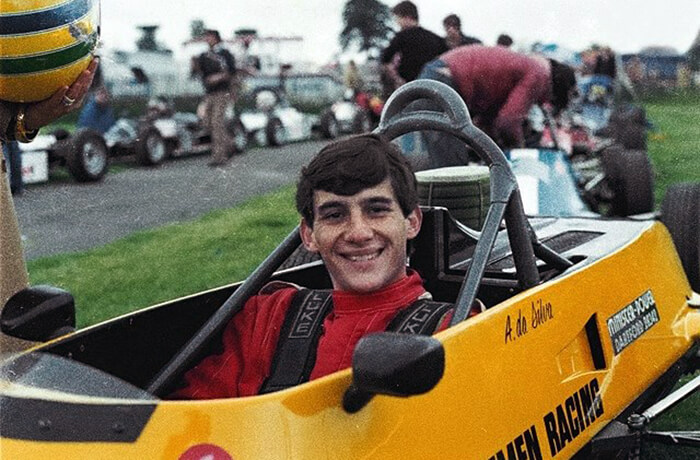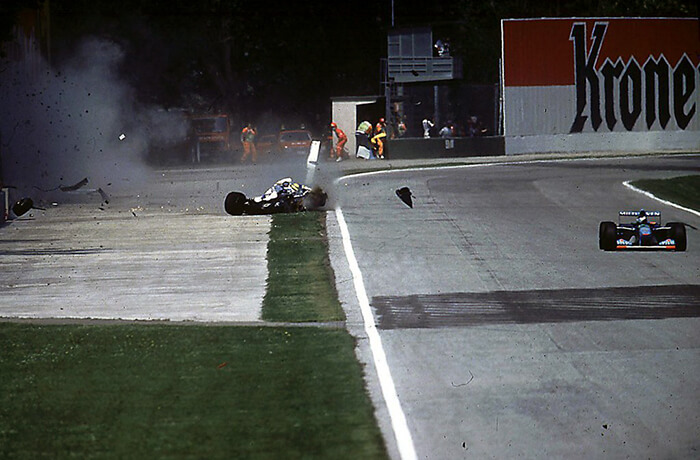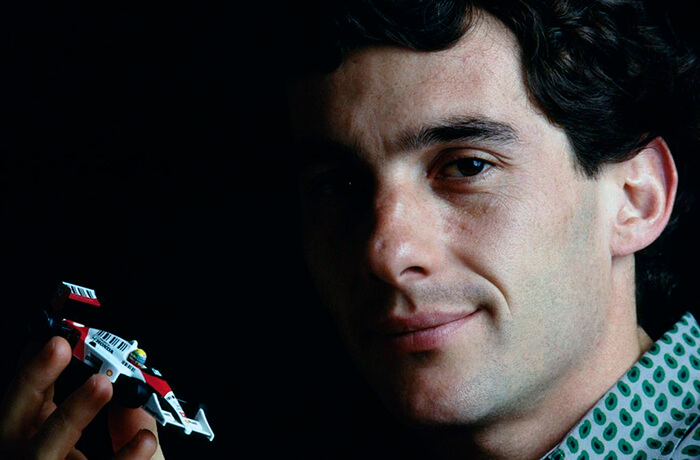
Copyright © 2021 - 2026
Sportsmatik.com. All Rights Reserved

| Full Name | Date of Birth | Birth Place |
|---|---|---|
| Ayrton Senna | 21 Mar, 1960 | São Paulo, São Paulo, Brazil |
| Sports | Team | Nationality |
| Formula One (F1) | Brazil (Formula One (F1)) | Brazilian |
| Family | ||
| Viviane Senna Lalli (Sister), Leonardo Senna (Younger Brother), Bruno Senna (Nephew) |
When it comes to read the perfection at the racing track and judge the qualities of a racing driver, by all means, Ayrton Senna da Silva leads not only the race track but also the hearts of racing lovers. Whenever he used to start the engine of his race car, it felt as if a comet was being seen in the sky, eye-catching! Although Senna is not between us today, yet he is alive in the hearts of his fans and followers, some of them have become the leading legends of motor racing. A three-time World Champion who led the F1 track to the most modest and safest zones, even after his demise. His life journey is an inspiration to all who crave hard for their passion and willing to chase their dreams with all pace. Let's talk more about the racing legend...
On 21st March 1960 in Santana, in the neighbourhood of Sao Paulo, a wealthy Brazilian landowner and merchant Milton da Silva and his wife Neide Senna da Silva were blessed with their second child. The boy whom they named Ayrton Senna da Silva. 4-years-old Senna built a keen interest in motor racing. As a teen, he participated in many kart racings and finally competed at a karting competition at the age of 13 that gave him the glimpse of his prolific F1 career.

Photo Credits: Instituto Ayrton Senna / commons.wikimedia.org
The journey began with a kart and soon moved to open-wheel racing when Senna competed in 1981 and won the British Formula Three Championship in 1983. In 1984, Senna made his F1 debut with Toleman-Hart. He scored his first WC point in his third GP in South Africa and repeated the victory at the Belgian Grand Prix. The following year, he switched to Lotus-Renault, the motorsport sister company of Lotus Cars and won six Grand Prix in the next three seasons.
In 1988, Senna began his racing with McLaren-Honda and bagged his first World Championship, competing in many of his races with his arch rival Alain Prost. He bagged his second world victory in 1990 after a fierce competition with Prost and went on to lift his third title in 1991. The following year, the F1 giant company Williams came up with some advancements in their car's engine and Senna was on the verge of facing technical problems in his car that often dragged him from the podium. Since Prost was a part of the Wiliams, it was nearly impossible for Senna to get boarded on the same boat. Inspite of all the dragging components, Senna went victorious in the GPs of Brazil and Europe, and eventually secured his place in the team of Williams in 1994.
I don't know driving in another way which isn't risky. Each one has to improve himself. Each driver has its limit. My limit is a little bit further than other's.
Within a span between 1984-1994, Ayrton counted numbers of performance worth appreciating - 161 GPs, 65 pole positions, 41 wins, 2982 leadership laps, 19 fastest laps, and 3 world titles. Although, Senna had a brilliant understanding of tracks and cars, yet he had to suffer from lots of on and off-track controversies and disagreements with the F1 organisation. But nothing drags a true winner from victories, Senna went on winning the races and the hearts from all around the world.
I am not designed to come second or third. I am designed to win.
Senna had a strong instinct of patriotism in his heart and never failed to show it for his people. In Senna's words, "The fact of being Brazilian just fills me with pride!" He always kept this patriotic charm with himself on and off-track. During the time of weak political and cultural scenarios in Brazil, Ayrton held the flag of faith in humanity and proud of being a Brazilian. He used to hold the national flag in each of his race. Even being known with the fact that the victory is in his favour, he always retained his roots and humbleness for his fans, people, and loved ones.

Photo Credits: pt.m.wikipedia.org
On 1st May 1994, It was the dark day of San Marino Grand Prix at Imola. He had some doubts about his FW16s and talked to the authorities earlier about the safety concerns for the racers and resumed his preparations for the race. On the D-day, Senna retained the lead from Michael Schumacher, but the race was interrupted with fatal accidents of other racers on the track. On lap 6, the race resumed, and Senna regained his pace. On lap 7, Senna's car left the racing line as he lost control due to a broken steering rod. Senna encountered a severe accident with his car being hit by the side-wall. After being rescued on the runway, he was transferred to the hospital and pronounced dead after a few hours. The whole nation cried its heart loud. Senna's death was a big lesson to the F1 and the safety concerns of racers.

Photo Credits: Karpouzi (Instituto Ayrton Senna) / commons.wikimedia.org
Ayrton Senna is not just a name for the Brazilian republic but an urge to listen to what their heart believes and pursue their aim with all firm determination, love and faith in God. For them, he is more than an F1 driver, and there is no one in Brazil unaware of this national hero. He was the man of values and the man with dedication for his dreams. He used to spend hours in understanding his car and building up the most effective and beneficial strategy to dominate the track even in the harshest wet conditions. Most of his career wins came in the hardest weather conditions because he trained himself hard for the worst scenarios and that's what made him the "The King of Rain".
Winning is the most important. Everything is consequence of that.
After his death, it was revealed that he had donated a big part of his fortune to help poor children. Shortly before his death, Senna was involved in structuring an organisation for education and wellness of poor Brazilian children that later on, became the Instituto Ayrton Senna (IAS). Even today, the racing tracks of Brazil recall Senna's unmatched legacy and speed combined with passion, determination and faith in God. For F1, he was not just another driver but an inspiration, the man with values and versatility of life and above all, a true sportsman. There can never be another Senna, but each of us can have his wisdom and speed in ourselves to go beyond the boundaries and leave a historical mark in our genre. That's all about Senna- The F1 Hero!
Video Credits: Gunpowder & Sky, LLC / YouTube
 Loading...
Loading...
Kindly log in to use this feature.
